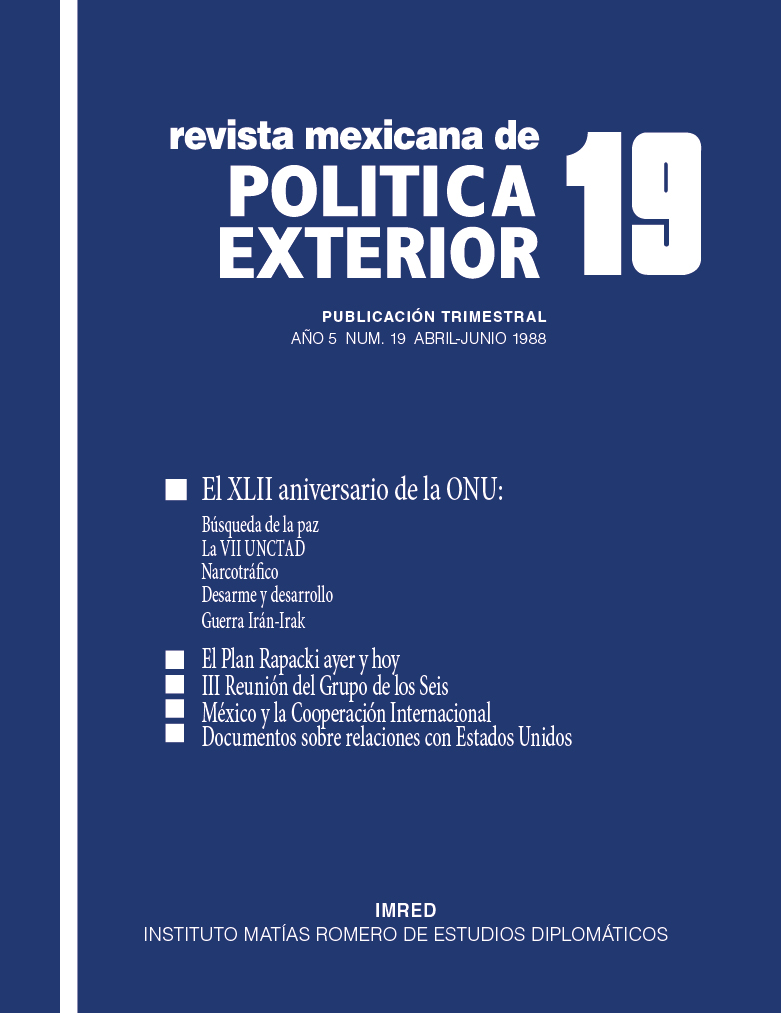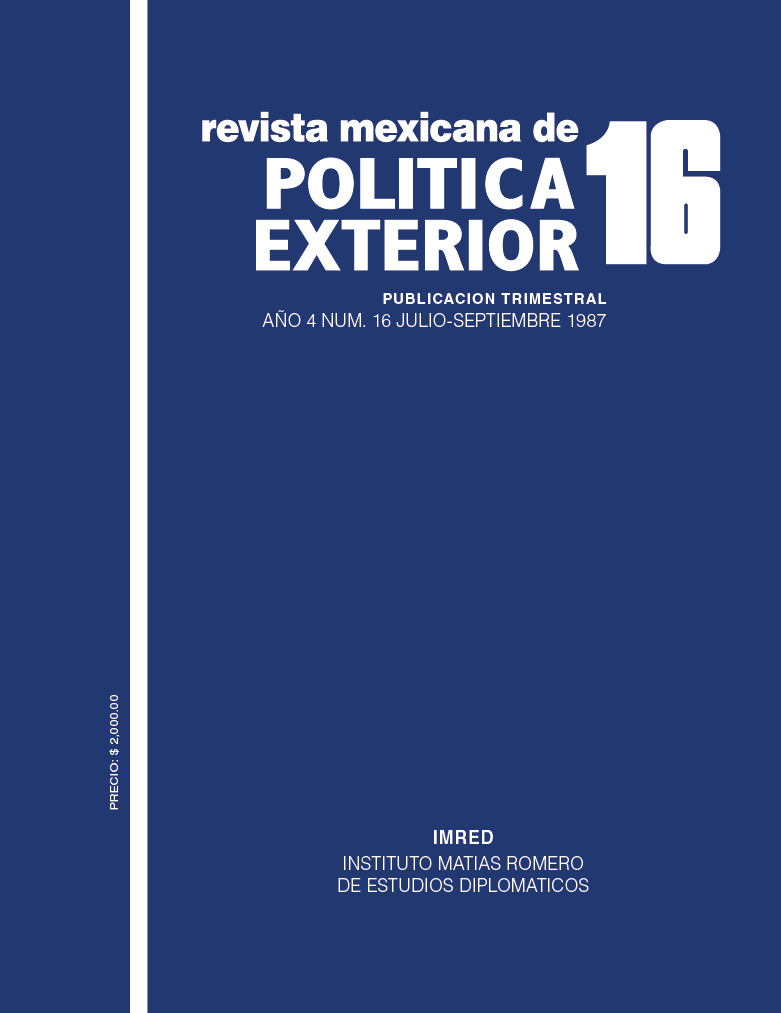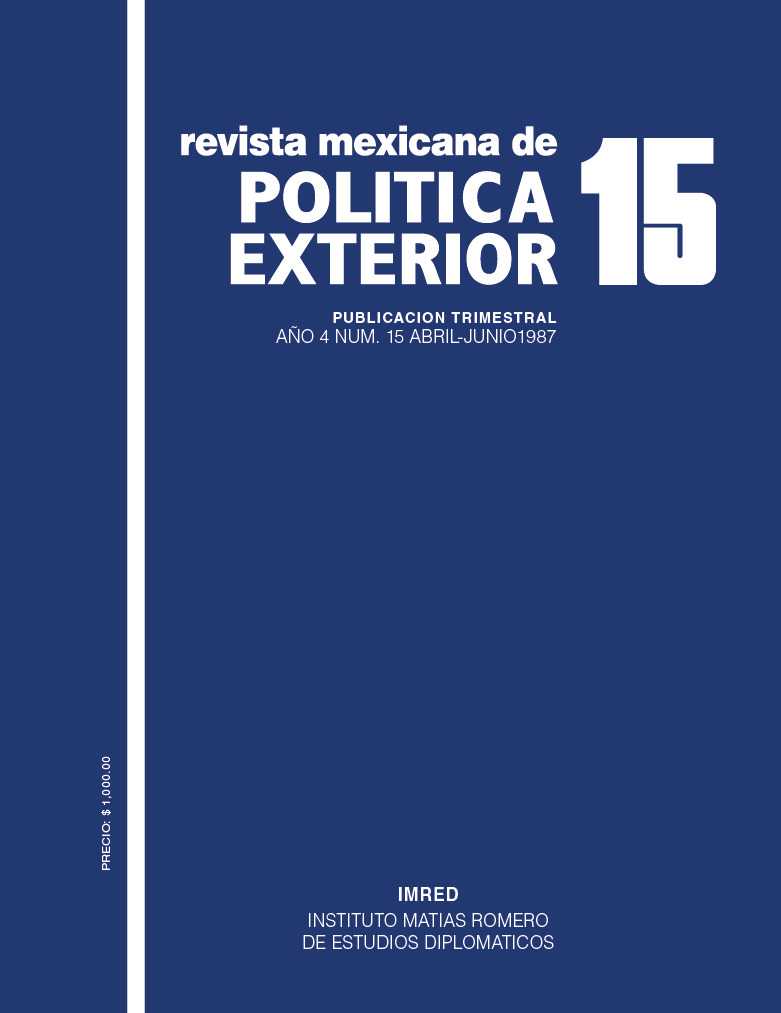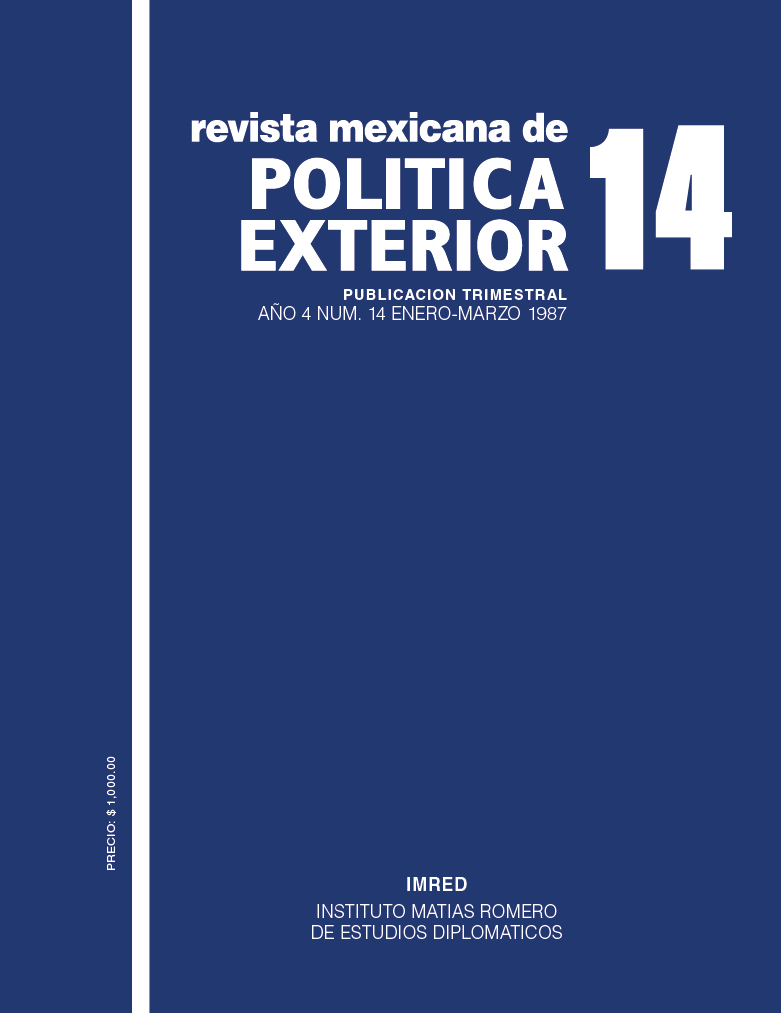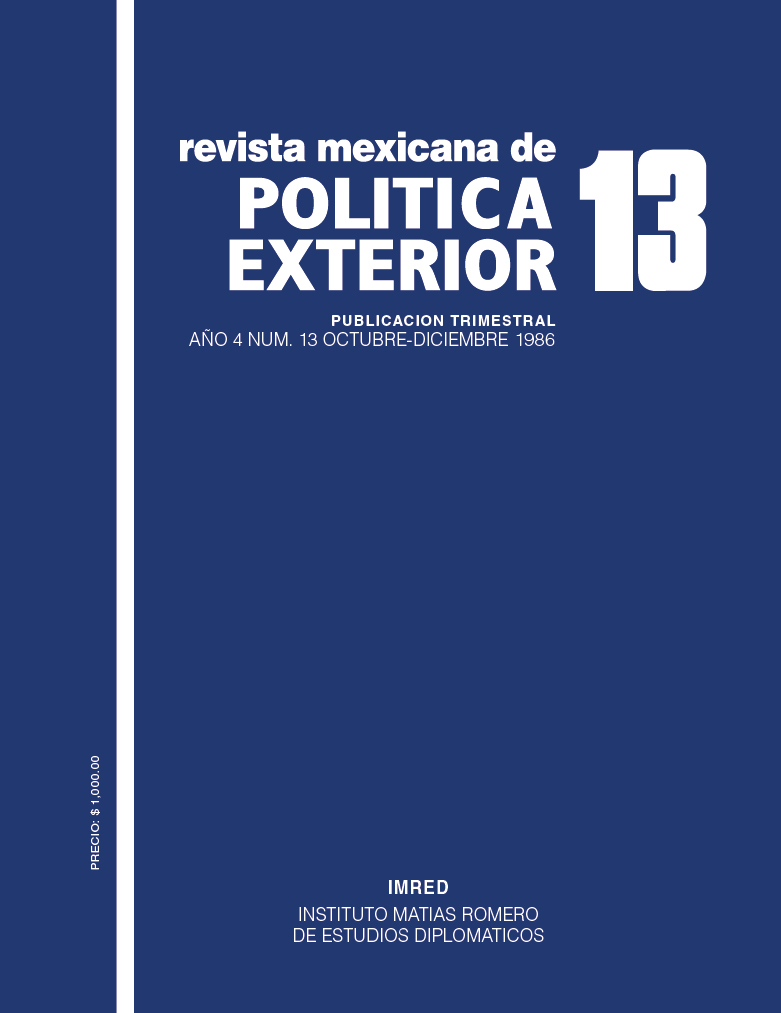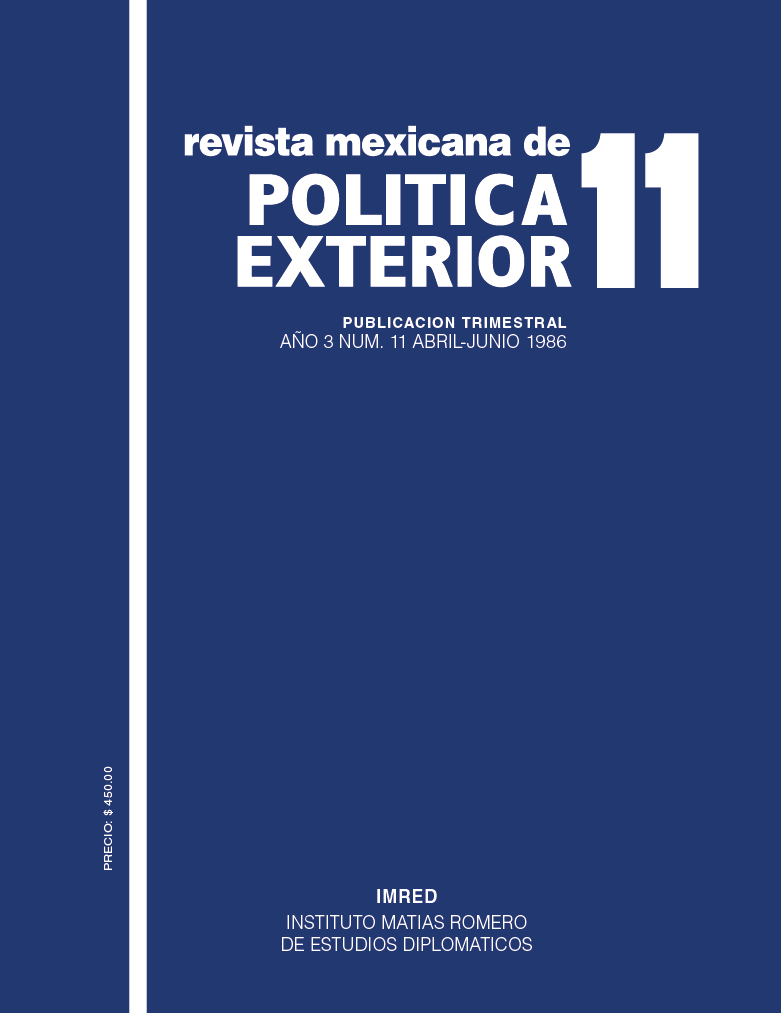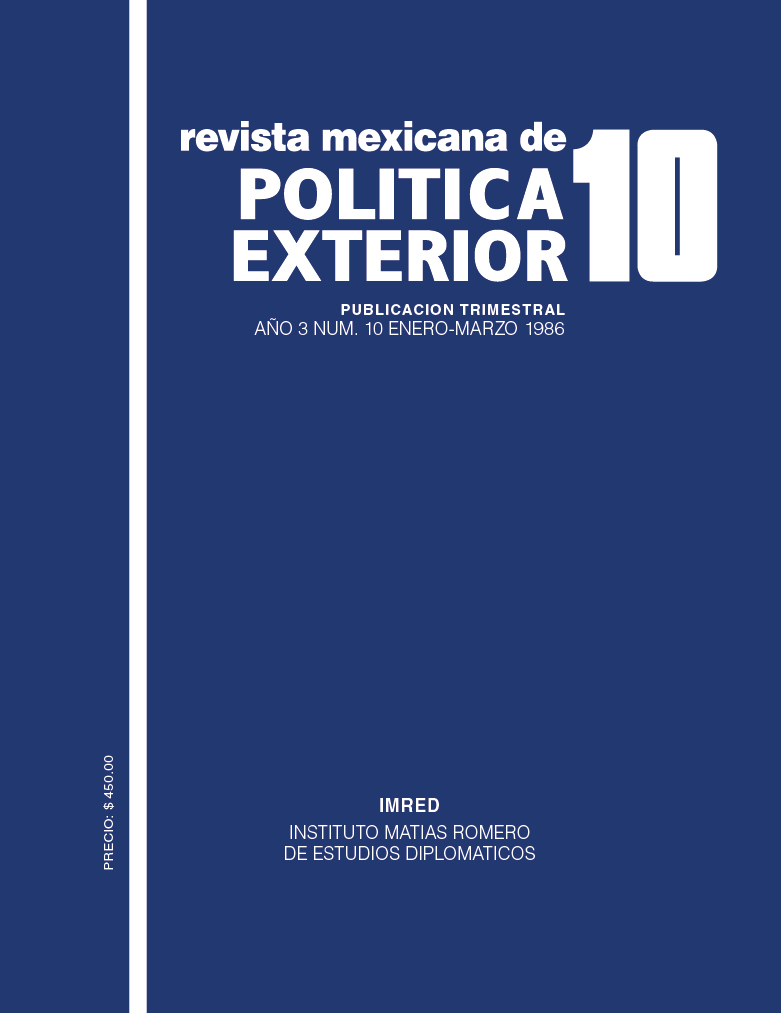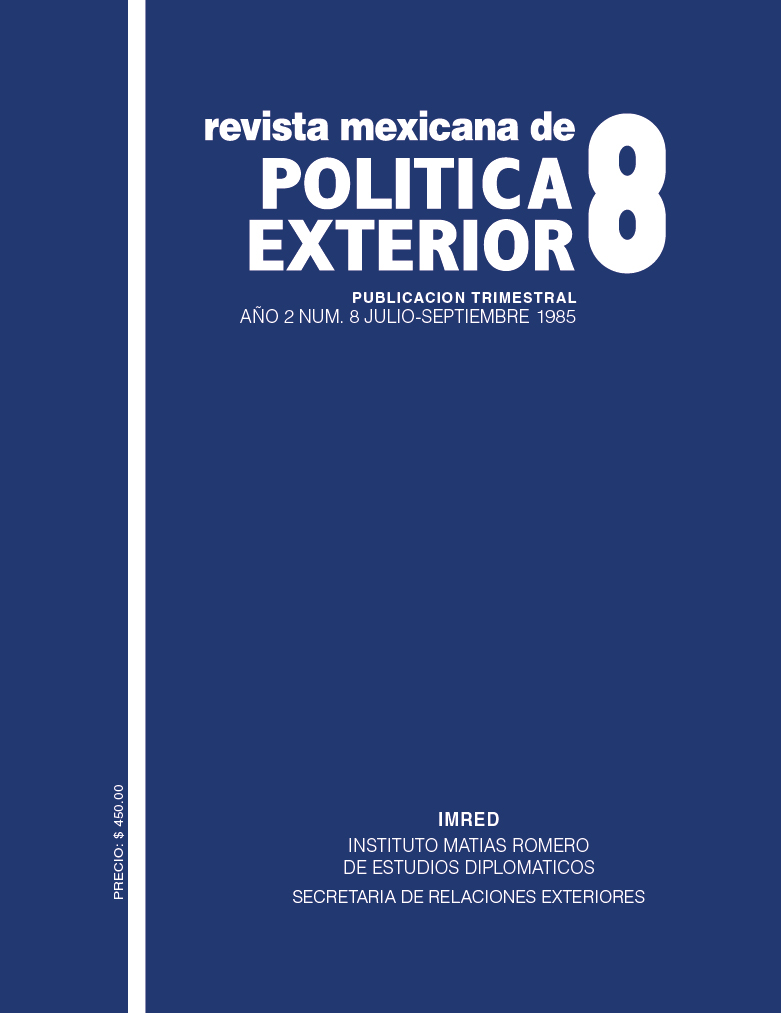The XLII anniversary of the United Nations. The Rapacki Plan: Yesterday and Today. Third Meeting of the Group of Six. Mexico and International Cooperation. Documents on Relations with the United States
No. 19 (1988)
This issue of the Revista Mexicana de Política Exterior is dedicated to highlighting the valuable work carried out in multiple fields by the world's leading Organization. To this end, the Essays section reproduces the papers originally presented on the occasion of the commemorative act of the XLII anniversary of the United Nations, held in the Auditorium of the Ministry of Foreign Affairs in October 1987. A document on the Rapacki Plan is also included, a series of pronouncements of the Mexican diplomacy and the document "Mexico and international cooperation", which accounts for the wide range of actions that the country has undertaken and crystallized in this field.
Semblance of Genaro Estrada: texts by Rabasa, Dueñas Pulido, Scheneider, Echeagaray and Fernández. Joint Declaration of the United States-USSR Summit. Initiative to Incorporate Foreign Policy Principles into the Constitution. Acapulco Commitment for Peace, Development and Democracy
No. 18 (1988)
One of the personalities who with his life and work have most influenced the new generations of Mexican diplomats is Genaro Estrada, to whose memory the Essays section of this edition of the Revista Mexicana de Política Exterior is dedicated. Don Genaro Estrada is usually remembered mainly for the invocation of the Estrada Doctrine, frequently mentioned and not always well understood, but also for other of the multiple activities that he developed in life and in which he also left an indelible mark. The materials reproduced here are intended to account for the intense and diversified work of don Genaro.
No. 17 (1987)
Slowly but surely, a new era of peace seems to be making its way into international relations. Within the East-West relationship, transformations in the political and economic constellation inside and outside each of the two superpowers facilitated the negotiation of an intermediate-range missile treaty in Asia and Europe. Regarding the situation in Central America, on August 7, the so-called Procedure to establish firm and lasting peace in Central America was signed in the city of Esquipulas, Guatemala, by the governments of Costa Rica, El Salvador, Guatemala , Honduras and Nicaragua. Somehow, the topics referred to, along with others of undoubted interest for Mexican diplomacy, are not unrelated to the content of this issue of the Revista Mexicana de Política Exterior, with which this publication closes a year full of challenges and hopes. We hope that this edition provides evidence on the long march that the world has undertaken towards peace. The following months will confirm or rectify our optimism.
No. 16 (1987)
In the first part of the “Essays” section, the Revista Mexicana de Política Exterior presents eleven short essays, the product of dissertations by officials from the Ministry of Foreign Affairs during the workshops of the XIII National Assembly of the Institutional Revolutionary Party held on 2 and 4 March 1987 in Mexico City. The second part of the section is made up of the collaboration of Jorge Eduardo Navarrete who studies the details of a basic issue on the agenda of regional economic priorities: foreign debt. In the part corresponding to "Speeches and documents", addresses related to Mexico's relations with Guatemala, Poland, the Soviet Union, Argentina and the United States, as well as the initiatives of the Group of Six, the Cartagena Consensus and the work of the Contadora and Apoyo groups in favor of pacification in Central America and the strengthening of mechanisms for political coordination and economic integration within Latin America.
No. 15 (1987)
On February 14, 1967, the Treaty of Tlatelolco was signed, the name by which the Treaty on the Prohibition of Nuclear Weapons in Latin America is commonly known. The Mexican initiative embodied in this legal instrument shows the importance of imagination, political will and active diplomatic coordination to stimulate the transformation of the different international scenarios into a safe and stable planetary home. This is the central theme of this issue of the Revista Mexicana de Política Exterior. The “Essays” section contains the exhibitions that were held in February 1987 to commemorate the 20th anniversary of the Treaty. The “Notes and Reports” section reproduces the Rapporteurship and the Declaration of Mexico, issued at the end of the extraordinary conference of ECLAC that took place in the capital of the Republic. In the “Speeches and documents” section, some of the most relevant communiqués issued by the Contadora Group and other texts referring to Mexico's bilateral relations are grouped. In commemorating the 20th anniversary of the Treaty of Tlatelolco, the Revista Mexicana de Política Exterior expresses its hope that continental thinking and political coordination in Latin America yield their best results for the benefit of our peoples.
No. 14 (1987)
The Revista Mexicana de Política Exterior is committed, now more than ever, to the task of presenting texts that serve for reflection, debate and analysis, all of them vital in our space and time. The collaborations published in the "Essays" section of this issue are located within important political and economic topics. They are materials that study and propose solutions for relevant issues of international relations in Mexico. In the "Notes and reports" section, two diplomatic notes presented by the Embassy of Mexico in Washington on trade and drug trafficking issues are published. Details regarding Central America and Mexico's participation in the world can be found in "Statements and Documents" where, among other materials, statements by the foreign ministers of the Contadora and Support groups, speeches by the Secretary of Foreign Affairs and those of the Executive Branch. These brief lines serve to once again reiterate the invitation to observe the events that are shaping the world scene on a daily basis. At the service of international information and analysis, this publication expresses, as always, its will to pursue its part in this task with determination.
No. 13 (1986)
The fight against armament and the eventual achievement of its purposes, if necessary, would still not be enough to achieve an international order guided by the force of reason and not by the reason of force. Issues such as international economic, monetary and financial imbalances; the reinforcement of hegemonic and globalist ideologies in certain foreign policies, whose germinal ethos is to deny the right to self-determination of peoples from southern Africa to Central America, and the growing questioning of multilateralism that some spheres of power carry out from perspectives eminently selfish, are other elements worth taking into account. Part of the theme stated above finds an echo in this edition of the Revista Mexicana de Política Exterior. The three texts in the "Essays" section structure some outstanding aspects of the task that Mexico performs daily in defense of its legitimate national interests. The timely anecdote, the lively story and the accurate question are the hallmarks of "China 1943", an interview conducted by Graciela de Garay with Don Alfonso Castro Valle, an experienced Mexican diplomat who recounts the vicissitudes of his transfer and stay in China. We hope that the material in the Magazine can contribute to the support of the processes of reflection, discussion and political action that the events of the world in general, and of Mexico in particular, demand of us as beings of our time.
No. 12 (1986)
Historians of Mexico's management abroad will surely have, when reviewing this period, the enormous motivation to study continuous and prolonged efforts for the sake of more universal desires aimed at guaranteeing the observance of principles such as non-intervention and the peaceful solution of conflicts. controversies. Peace in the Central American region, for example, has been one of the most noble and authentic battles of the Mexican Government for several years. Likewise, the search for universal peace, through disarmament and arms control, has also been the object of world recognition. From the Treaty of Tlatelolco to the Declaration of Mexico for Peace and Disarmament, the struggle of our country, which together with others clamor for true peace, has been continuous. Among the issues that have "their place" on the agenda, there are some that have traditionally been part of foreign policy, as is the case of the migration problem.
No. 11 (1986)
In 1985, within the framework of the celebration of the beginning of two basic feats for the country, that is, Independence and the Revolution, the Mexican Foreign Ministry, through its academic body, the Matías Romero Institute for Diplomatic Studies, organized a Cycle of Commemorative Conferences of the Seventy-fifth Anniversary of the Mexican Revolution, in which distinguished officials and representatives of the academic world participated. The result of their deliberations and exchanges is the content of this issue of the Revista Mexicana de Política Exterior. The first group of essays refers to the guidelines and principles of the foreign policy of Lázaro Cárdenas, which was the occasion for a series of actions ranging from his intransigent defense of the right of asylum to non-intervention, passing through the sovereignty of natural resources, mainly oil. In the second group, the authors return to fundamental aspects of the international theory and praxis of the first social revolution of the 20th century, as well as its doctrinal consistency. Reflection and well-deserved homage is the tone presented by the works on the international thought of Jesús Reyes Heroles and Jesús Silva Herzog.
No. 10 (1986)
Illustrating the trajectory, the role of the institutions and the permanent struggle that Mexico wages in favor of a fairer and freer world society, is the objective of this issue of the Revista Mexicana de Política Exterior. With the intention of following the thread that links history and contemporaneity, the "Essays" section presents a series of works by prominent public officials on the congruence between the ends and means that our country has chosen to guide its conciliatory participation in Central America; Mexico's international participation, which is both committed and dynamic; economic and social development, and article 76 of the Constitution. In the "Notes and Reports" section, materials are included that show the tenacious effort of harmony and cooperation that has earned Mexico sincere recognition from the international community and the gratitude with which we receive foreign aid. We highlight the most important pronouncements of the President of the Republic and officials of the Ministry of Foreign Affairs, in the "Statements and Documents" section.
No. 9 (1985)
The sad events that occurred in the country during the last fortnight of September particularly affected Mexico City, transforming daily activities. The cosmopolitan character of the great city generated a disturbing expectation in all the nations of the Earth. The tremor affected the national life, but allowed the action and solidarity of the Mexican people, as well as the consolidation and strengthening of friendship with all the peoples and governments of the world. These, with a great spirit of service and willingness to cooperate, have testified to the high appreciation that exists for our country, which is a reflection of a principled foreign policy and the defense, even in adversity, of the best and progressive causes of humanity. , as well as the kindness of the bonds of brotherhood and collaboration that we have been able to create with all nations, turned to rescue and recovery efforts, working together as one body with our people. This issue of the Revista Mexicana de Política Exterior, taking advantage of the closure of this edition, stands as a platform of sincere and fraternal gratitude to the international community for the invaluable moral and supportive support provided to the People and Government of Mexico. This edition brings together the works exhibited by leading specialists in the Cycle of Conferences on Disarmament Related to Conventional Weapons, organized by the Matías Romero Institute for Diplomatic Studies, from April 22 to 26, 1985. In all the essays, some of the efforts that Mexico does to create and build an adequate line of action on disarmament, both nuclear and conventional.
No. 8 (1985)
For the second time, the Revista Mexicana de Política Exterior dedicates one of its numbers to the topic of Human Rights, which it considers essential both in the agenda and in the actions of Mexico's foreign policy, as well as in the reality of our time at the international level. Once again, valuable materials are included, almost all of them presented at the Round Table that the Ministry of Foreign Affairs, through its academic body, the Matías Romero Institute for Diplomatic Studies, held on December 13, 1984, to commemorate the XXXVI Anniversary of the Proclamation of the Universal Declaration of Human Rights. Two important works that justly show the constant efforts made to keep alive the discussion on Human Rights and their effective legal instrumentation and social application, are included in the "Notes and Reports" section.

